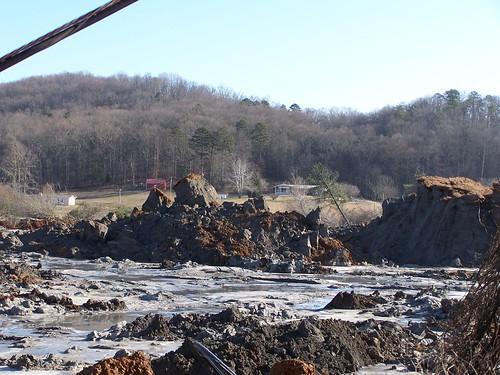Primarily, we are worried about our children. Our kids are sick with chronic illnesses that are passed off as merely asthma. Parents don’t know where to go for answers and are struggling to pay for the medical bills they are acquiring.
Those are the words of Sarah McCoin, member of the Tennessee Coal Ash Survivors Network and a seventh generation resident of Harriman, Tenn. – site of the devastating December 2008 Tennessee Valley Authority (TVA) coal ash spill.

McCoin testified Tuesday before the House Transportation and Infrastructure Committee at a hearing about the TVA spill (read her testimony here – PDF). Committee members said they continue to investigate the potential causes of the coal ash spill at TVA’s Kingston Fossil Plant, the response and cleanup, as well as hear about potential water quality implications from the ash spill.
We stand with McCoin and her organization, as well as many others who see the two main goals in the aftermath of the coal ash spill: TVA must pay for a proper, comprehensive cleanup and the Environmental Protection Agency (EPA) must regulate coal combustion wastes.
“Our concerns have fallen entirely on the deaf ears of the TVA,†testified McCoin. “We need more information and communications from them and any other involved government agency.
“TVA must be held accountable for the damage they have caused. They must create and make public a plan that will make our rivers safe again, while being considerate of the health, safety and daily lives of the community.â€
McCoin also used her testimony to point out that TVA’s current river dredging plan is incomplete, especially as the dredged coal ash will be left in a temporary place until a permanent plan is in place. Without federal coal ash regulations, she said, “there are not consistent guidelines for coal ash storage.â€
Currently there exists no uniform federal regulation regarding coal ash storage and containment. Coal ash is known to contain toxic heavy metals including, antimony, aluminum, arsenic, beryllium, boron, cadmium, iron, lead, manganese, radium, selenium, thallium and uranium. These metals can be linked to a wide variety of health impacts, many of which Harriman residents are experiencing. While these metals are toxic, coal ash itself is not considered a hazardous waste and therefore continues to be unregulated by EPA.
We need federal coal ash regulations from EPA to help avoid catastrophes like the TVA spill and the other coal ash spills that have happened since then. There are more than 100 of these coal sludge containment ponds around the U.S. and without regulation, the next Harriman spill could happen in any of these communities, sickening families and contaminating the land and water.
In early March, the Sierra Club joined 107 other environmental and community organizations in sending a letter to EPA Administrator Lisa Jackson calling for coal combustion waste regulations and listing 12 requirements for those regulations. You can read the letter here (PDF).
So far, the Obama Administration has been receptive to this call, with Jackson saying she is committed to regulating coal combustion waste.
For the residents around Harriman who are now dealing with the coal ash everyday, McCoin says fear has set in. The cleanup seems as if it will never be complete and residents do not yet see the light at the end of the tunnel. “It’s like trying to get all the sand off a beach,†said McCoin of the TVA’s cleanup efforts.
“For many community members, the worries about finances, property values, their health and their futures are more than they can bear.â€
EPA should do everything possible to avoid another tragedy like this.